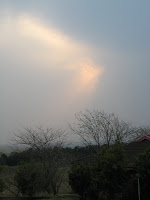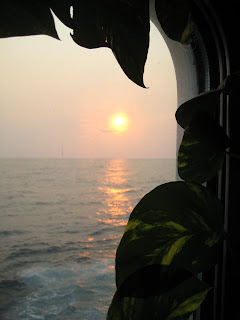Jeden morgen um 8 Uhr fährt eine engagierte Gruppe von Zahnärzten, Zahnmedizinische Fachangestellte, eine Zahnhygienikerin und Übersetzer aus Lome, Togo zur Zahnklinik , die von Mercy Ships an Land betrieben wird. Die Klinik befindet sich 25 Minuten von der Africa Mercy entfernt.
Das dreistöckige Gebäude, das die Zahnklinik beherbergt, gehört dem Gesundheitsministerium. Es verfügt über eine Klimaanlage und bietet ausreichend Platz für eine komfortable Umgebung für Patienten und den Mercy Ships Mitarbeitern. Die Klinik hat alles , was man braucht: Voruntersuchungsraum, Rezeption, Wartezimmer und Behandlungsraum.
Die Voruntersuchungen finden Montags und Donnerstags statt, wo immer so um die 250 untersucht werden. Gini Porter, Dental Koordinator und ihre Assisitentin Sieh Moore, führen die Voruntersuchungen bei den Patienten durch um die zahnmedizinischen Probleme zu identifizieren., wie Karies, Deformationen und anderen Abzessen.
Die Koordinatoren vergeben dabei so 50-60 Termine täglich. Die Patienten die Montags untersucht worden sind erhalten dabei Termine von Montags-Mittwochs, und die Patienten die Donnerstags untersucht worden sind , erhalten Behandlungstermine von Donnerstags-Freitags. Dabei sind die meisten Patienten bereit den ganzen Tag zu warten , bis sie von den Mery Ships Zahnärzten behandelt werden.
Aufgrund des Mangels an zahnärztlichen Leistungen in Togo haben die meisten Menschen hier noch nie einen Zahnarzt gesehen. Die meisten von ihnen wissen nicht, wie man die Zähne richtig pflegt. Die Zahnklinik behandelt dieses Problem in mehrfacher Hinsicht. Im Warteraum werden die Patienten unterrichtet, wie man die Zahnbürste richig benutzt und es werden ihnen auch Zahnbürsten mitgegeben. Dann werden die Zähne durch die Dentalhygienikerin gereinigt , um das Risiko von Karies und Infektionen zu veringern.
Die Zahnklinik wird bis August bedient, während des gesamten Togo Einsatzes. Die zahnärztlichen Teams arbeiten dabei fleissig jeden Tag, Zähne ziehen, Löcher füllen und sogar neue Zähne verpflanzen. Dabei wird geschätzt, dass nun mehere tausend Menschen in diesem Einsatz zum ersten Mal in ihrem Leben Linderung ihrer Schmerzen erfahren.
Beatrice Stoeckli , eine der Patienten, drückte ihre Begeisterung, dass sie endlich Heilung bekommt , so aus: "Ich wusste nicht wie ich Zahnbehandlung bekommen sollte, also began ich zu beten. Als ich den Namen Mercy Ships hörte, sagte ich, die Gnade Gottes berührt mich, und wo auch immer er wirkt, er macht den Weg frei für seine Gnade."










Frei übersetzt von einem englischem Artikel:
Written by Joy Clary
Edited by Nancy Predaina
Photos by Debra Bell
Die Africa Mercy im Trockendock in der Werft in Durban







































